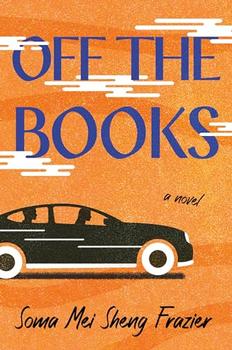Book Club Discussion Questions
Want to participate in our book club? Join BookBrowse and get free books to discuss!
Please be aware that this discussion guide will contain spoilers!
-
Lăoyé is constantly breaking the rules: he smokes weed on the job, flouts the dictates
of polite society by shouting at a movie audience, and advises his granddaughter to let
clients hire her "off the books." While some laws are ethical and necessary, others—such
as those subjecting people to human rights violations—may fall on the wrong side of
history. Mei adores her grandfather, and for the most part trusts his judgment. Who is the
person you trust the most? If you witnessed that individual breaking a law, which would
you question first: the person, or the law?
-
What are your perceptions of Ivy League colleges like the one Mei drops out of? What
are your perceptions of Oakland, California, her hometown and "favorite place"? What
surprising insights do you possess about your own hometown or education, and do others hold contradictory views?
-
Mei's friend, Mindy, tries to talk her into motherhood. But Mei's maternal feelings do not awaken until Anna, a young girl who needs her desperately, draws them out. What does it mean to be a parent? If we are not parents, how responsible are we for others' wellbeing?
-
What do you think about the situation of China's Uyghur population? Did this book lead
you to read more about the Uyghur people—or to seek out podcasts, movies or TV shows about them? If so, what did you discover?
-
Mei, Henry and Anna drive across the US, stopping in small towns along the way. If you
could drop everything and take a road trip today, where would you go and why?
-
On pages 115-116, Mei and her mother clear up a longstanding miscommunication. Mei believes her mother once called her a tramp to "slut-shame" her for wearing a sheer
black blouse. However, when confronted, her mother clarifies that the comment actually
referred to Mei's ripped jeans: "Tramp is a hobo. Wear ripped clothes because they got
no money." Interactions like this ultimately lead Mei to the conclusion that she needs
to get to know her mother better. How might Mei have approached the conversation
differently to avoid the miscommunication about her mother's comments, and can you
recall a time when a crucial miscommunication impacted you? If so, what did you take
away from that experience?
-
Mei mentions her mother's "barbarous honesty." It can be difficult to balance candor with tact. Do you find this a difficult balancing act? Would you rather others be straightforward with you, or withhold certain truths to spare your feelings?
-
Obeying the Nguyen twins' request to stay silent about what happened in the woods
compels Mei to contemplate the fetishization of Asian and Asian American women, as
well as the lack of protection for undocumented immigrants. Later, her conversations
with Cherry, a sex worker, deepen her empathy. What does your citizenship mean to you, and what is your stance on sex work? If you had to flee your country suddenly and seek asylum elsewhere as an immigrant, what would you bring with you and what job would you apply for?
-
Did you "ship" Henry and Mei from the start—and now, at the end of the book, are you
rooting for their relationship to succeed?
-
Mei fears the trauma of her father's suicide has left her with abandonment issues. What
are your experiences with friends or loved ones struggling with mental or physical
wellbeing? Do you think learning her father's medical diagnosis (early onset Alzheimer's) will help Mei process her grief and forgive him for "leaving them"? Is it fair that she might be slower to forgive him if he'd taken his life due to depression—and do you feel we, as a society, are becoming more aware of how to help people cope with mental illness?
-
Henry, chatting with a server in a restaurant, refers to his "meemaw." There are many
loving ways to refer to one's grandmother: gran, abuela, lăolao, nana, yaya, jadati, ouma, glamma, bubbeh… What affectionate nicknames do people use in your family? Does the novel's usage of untranslated Mandarin Chinese nicknames and dialogue immerse you into Mei's family life and her personal experience of being less fluent?
-
Flip to page 216 and revisit the author's final words in the Acknowledgments: "And, finally, please allow me to acknowledge my many fellow writers who lack the freedom or voice to be heard. Your silence reverberates." How can suppressed voices reach us, and why is it important to listen?
Unless otherwise stated, this discussion guide is reprinted with the permission of Henry Holt and Company. Any page references refer to a USA edition of the book, usually the trade paperback version, and may vary in other editions.
